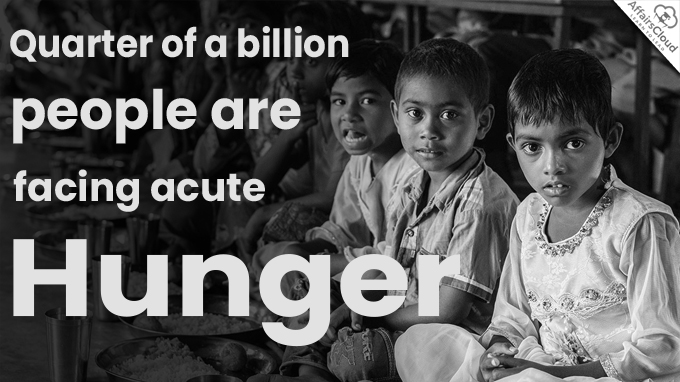 The flagship publication of the Global Network Against Food Crises (GNAFC), ‘Global Report on Food Crises (GRFC) 2023’, estimates that nearly 258 million people (i.e. 22.7% of the analysed population) in 58 food-crisis countries/territories were faced acute food insecurity at crisis or worse levels (IPC/CH Phase 3-5) in 2022, up from 193 million people in 53 countries and territories in 2021.
The flagship publication of the Global Network Against Food Crises (GNAFC), ‘Global Report on Food Crises (GRFC) 2023’, estimates that nearly 258 million people (i.e. 22.7% of the analysed population) in 58 food-crisis countries/territories were faced acute food insecurity at crisis or worse levels (IPC/CH Phase 3-5) in 2022, up from 193 million people in 53 countries and territories in 2021.
- This is the highest number in the 7-year history of the GRFC.
- GRFC 2023, the 7th edition of the annual report produced by the Food Security Information Network (FSIN), was launched by GNAFC – an international alliance of the United Nations, the European Union, governmental and non-governmental agencies, working to tackle food crises together.
IPC-CH Dashboard:
i.The Integrated Food Security Phase Classification- Cadre Harmonisé (IPC-CH) Dashboard is a visual display of the total number of people experiencing or facing high levels of acute food insecurity classified in Crisis or worse (IPC/CH Phase 3 or above).
ii.GRFC 2023 marks the 4th consecutive year of rising numbers of people in IPC/CH Phase 3 or above or equivalent due to persistently high numbers in some countries, worsening situations in others.
Key Findings of the Report:
i.253 million people were in Stressed (IPC/CH Phase 2) in 41 countries/territories with IPC/CH analyses in 2022. Around 35 million people were in Emergency (IPC/CH Phase 4) in 39 countries/territories.
ii.As per the report, more than 40% of the population in IPC/CH Phase 3 or above resided in just 5 countries – Afghanistan, the Democratic Republic of the Congo, Ethiopia, parts of Nigeria (21 states and the Federal Capital Territory(FCT)), and Yemen.
iii.People in 7 countries faced starvation and destitution, or catastrophe levels of acute hunger (IPC/CH Phase 5) at some point during 2022. More than half of those were in Somalia (57 percent), while such extreme circumstances also occurred in Afghanistan, Burkina Faso, Haiti (for the first time in the history of the country), Nigeria, South Sudan and Yemen.
Main Drivers of Food Crisis:
i.Economic shocks (including the socioeconomic impacts of COVID-19 and the repercussions of the war in Ukraine) became the main driver in 27 countries with 83.9 million people in IPC/CH Phase 3 or above or equivalent.
ii.Conflict/insecurity was the most significant driver in 19 countries/territories, where 117 million people were in IPC/CH Phase 3 or above or equivalent.
iii.Weather/Climate extremes were the primary driver of acute food insecurity in 12 countries where 56.8 million people were in IPC/CH Phase 3 or above or equivalent
Way Forward:
i.According to 2023 projections (as of March 2023) for 38 of the 58 countries/territories, up to 153 million people (i.e. 18% of the analysed population) will be in IPC/CH Phase 3 or above.
ii.Around 3,10,000 people are projected to be in IPC/CH Phase 5 across 6 countries – Burkina Faso, Haiti, Mali, parts of Nigeria (26 states and the FCT), Somalia and South Sudan. (A three quarters of them were in Somalia).
What is a food crisis?
A food crisis occurs when levels of acute food insecurity and malnutrition rise sharply at local or national levels, raising the need for emergency food assistance.
Recent Related News:
According to a joint report by the United Nations (UN) Agencies titled “Asia-Pacific Overview of Food Security and Nutrition 2022: Urban Food Security and Nutrition”, an increasing number of people in Asia lack enough to eat as food insecurity rises with greater prices and worsening poverty.
About Global Network Against Food Crises (GNAFC):
European Union, World Food Programme (WFP) and Food and Agriculture Organization (FAO) launched the Global Network Against Food Crises at the 2016 World Humanitarian Summit (WHS).
It is an alliance of humanitarian and development actors united by the commitment to tackle the root causes of food crises and promote sustainable solutions to end Hunger.




